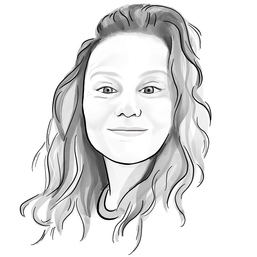
Lessons learned after a year of online education: ‘The days of big lectures are really over now’
Educationalists at the UvA saw the transition to online lectures during the corona crisis as a unique opportunity to learn about digitization in education. What works, what doesn't? Their findings have since been compiled in a voluminous research report. Educationalist Monique Volman explains. ‘The core of academic teaching is the conversation about the subject matter and the application of the subject matter, in a small-scale way, after all.’
Why is it so important to do this study?
‘As soon as we started teaching online I thought: things are going to happen here that are super interesting. It would be a shame not to be on top of it. The UvA was already involved in a process of researching the implementation of digitization and was looking for a form that would suit the university. Then you have to seize this opportunity.’

Dozens of UvA students and staff had their say on education during the corona period during focus groups. What were the most important lessons?
‘There are a number of them. One of the most striking things, from the student perspective, was that online education was generally very well structured. Teachers had to be very clear about objectives, when students were going to do what and with whom, or where students could find things in the Canvas learning environment. Although many students were unhappy with the overall situation, they said they knew better afterwards.
Something else that stood out was that teachers experimented a lot with tools to activate students. They couldn't do that through the personal contact in the lecture hall, they had to organize it in a better way. Lecturers have been very creative in coming up with assignments to get students started. In doing so, many lecturers had the experience that the breakout rooms in Zoom worked really well, even the shyer students got to talk more.'
‘The third thing is that we have been talking about flipping the classroom for a long time. We have become accustomed to transferring knowledge during lectures, and expecting students to process the material themselves at home. Actually, you want to flip that around: the knowledge transfer takes place before lecture. Students, for instance, watch a knowledge clip or read the textbook carefully, so you can engage in processing, application and making assignments during the lecture. That became more obvious: publishing knowledge clips or making recorded lectures available, and using the lecture time for discussion, going into depth.'
Meanwhile, the UvA plans to bring all education back to campus. So how do we keep those good things?
‘We experienced a lot of misery during the corona crisis, but there were also good things, and some of them students and faculty will want to continue. It turned out to be very nice to be able to do some work from home, or get input online, or arrange guest lecturers and guest speakers from other countries. I also think that teachers will continue to encourage students to do some preparation already through Canvas.
I hope that the experience that knowledge transfer can also take place in other ways than during a lecture, for example through those knowledge clips, will lead to a lasting change. I think that the time of big lectures is really over, or should be over soon. Surely the core of academic education is the conversation about the material and the application of the material, in a small-scale way. We’ve found that students like to be seen as people, and to be present in lectures with their own interests and perspectives.’
I can imagine that teachers quickly fall back into their old ways, for example because they already have their hands full with on-campus education.
‘That does not happen automatically, and not to everyone. But it is important to make good use of the positive aspects of digitization and to develop them further. For example, you can do bits of teaching online and use digital tools, both during lectures and in preparation.
The university must facilitate this in multiple ways. In many lecture halls, for example, you can already give hybrid lectures. You can also think about scheduling and teacher professionalization. It might help that this development in education has come from the bottom up: people may be unhappy about emergency remote teaching that had to be set up at lightning speed, but it has enabled people to do something that suits them. Digitization projects often fail because people think: I don't see the advantage, it doesn't suit me, the top bosses want to determine how I should teach.’
Will you continue this study?
‘I would like to do so. It is very important to continue the research and to see how lecturers shape it, especially now that we are going to experiment with mixed forms of digital and physical education. Being back on campus after a year of online classes sometimes leads to funny situations: for example, I've already noticed that students were unhappy that they couldn't physically go into breakout rooms, because a whole hall of students working in groups caused a tremendous noise. It makes you think about how you can organize it in a different way. We want to highlight the good examples, analyze them and make them available to other teachers for inspiration, so that everyone can learn from them.’

